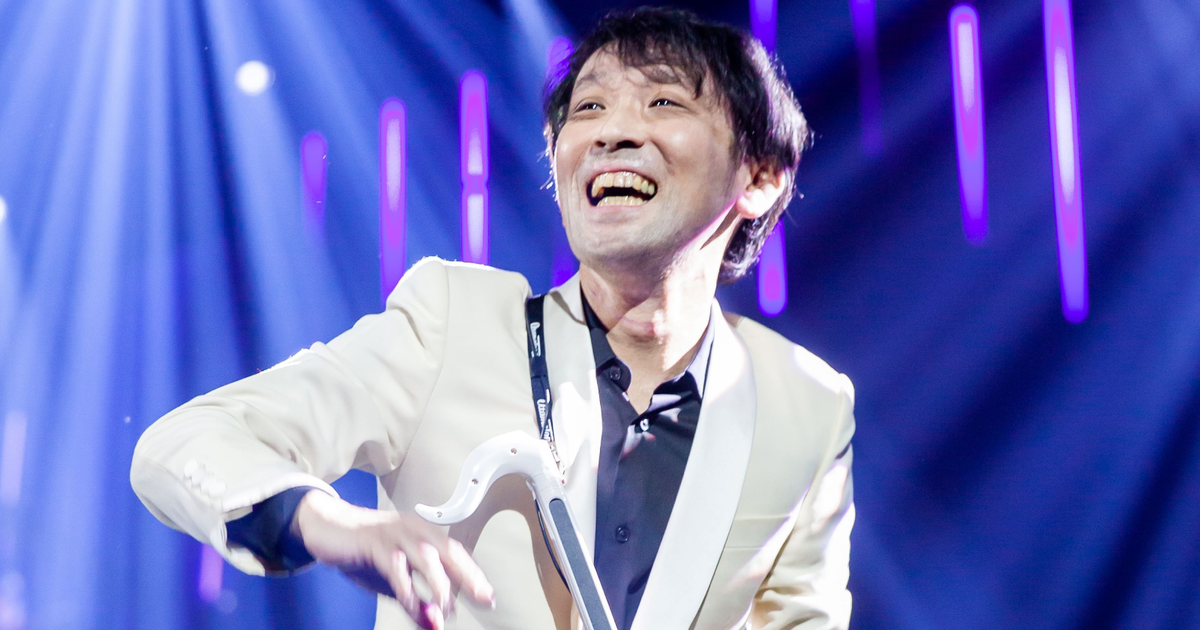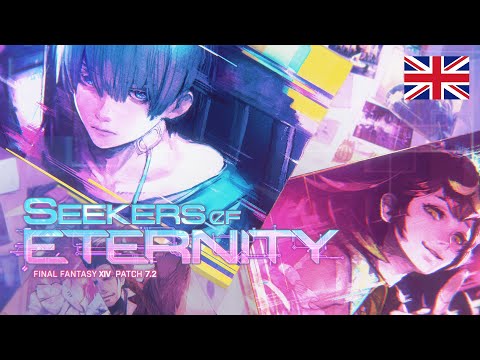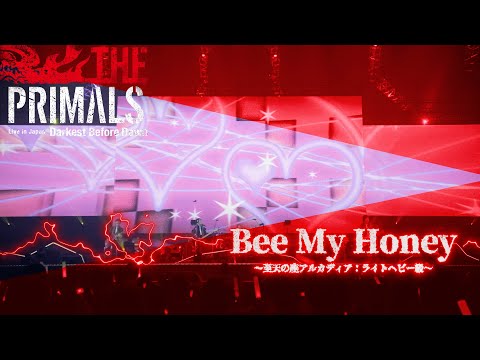Final Fantasy 14 producer and director Naoki Yoshida is the predominant and popular figurehead for the MMORPG, but there are plenty of other developers on the game beloved by its community. One of those is composer Masayoshi Soken.
While Nobuo Uematsu composed the remarkable scores for the early games in the series, Soken has taken up the mantle as the composer for Final Fantasy 14 and also Final Fantasy 16.
His musical style is an eclectic mix of genres, from delicate piano and vocal pieces to heavy metal rock songs. That led to not only the regular piano concerts at the Fan Fest events, but the development team’s in-house rock band The Primals (named after the game’s summonable monsters), with Soken on electric guitar alongside localisation director Michael-Christopher Koji Fox fronting on vocals.
Indeed, these performances were highlights at the Fan Fest events I attended in 2023. Much of that was due to Soken himself: after particularly emotional renditions from pianist Keiko and singer Amanda Achen, Soken arrived on stage with his Otamatone instrument to undermine his own compositions to much laughter. In person, too, he’s a humble and fun-loving interviewee.
Notably, Soken was secretly battling cancer during development of the Shadowbringers expansion. He revealed this at the digital Fan Fest in 2021 – seeing his joy on-stage ever since has only endeared him to the community further.
Ahead of a concert this weekend celebrating the music of Final Fantasy 14 and 16, I had the chance to speak with the composer.
You started your career doing a lot of sound design work. How do you think that affected your approach to composition?
I think that experience is definitely reflected in everything that I do. In terms of sound design, if you are putting the game experience first, then as a core thought you would have to think about that coming before the composition. I think it is very important. Something that I wouldn’t want is for people to see game composers as artists [as opposed to developers]. The reason for that is because making music for games, I need to think of the music as just one part of the entire game experience. If we think about just the sound, you have the sound effects, and you have the voice lines, as well as the environment sounds, and then you have the music. So all of the elements need to come together naturally, combined, and then that becomes the sound of the game. If I hadn’t learned sound design beforehand, then I wouldn’t have had as complete of an understanding of this. In the realm of game composers, I guess that title is quite a flashy thing, so people see it as something similar to an artist. But I think anyone who wants to go into game composition should learn sound design first.
You previously also worked on the Mario Hoops 3-on-3 score with [Mario and Zelda composer] Koji Kondo, what was it like to work with him?
Using the environment of the Nintendo DS was incredibly difficult because there was a limitation of what could be played. For example, on the game selection screen for Hoops, I think, there’s a song that plays, but back then we didn’t have the specs or the capacity in terms of storage or memory to allow this. In terms of the DS, people might have been like, ‘it’s not possible on the DS’, but I think it was a great learning experience for me that made me learn how to do the impossible. Back then there were a lot of limitations in terms of the hardware compared to contemporary hardware, so I think that experience of having few tools to do something, and developing the ideas needed to go through that process, has allowed me to have the experience needed to create lots of ideas now.
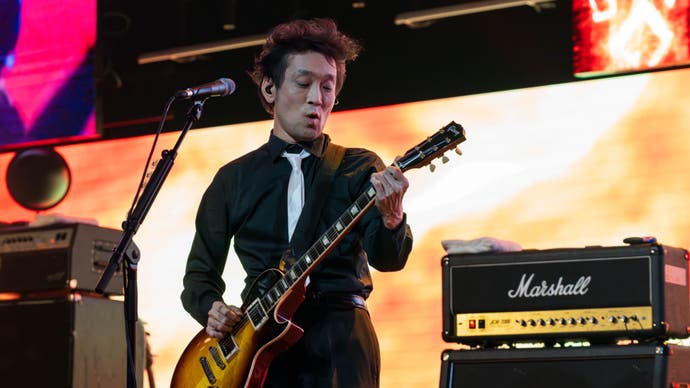
Since composing the soundtracks to Final Fantasy 14 and 16, how does it feel to be the composer for two mainline Final Fantasy games and to be following in Nobuo Uematsu’s footsteps? Do you feel a lot of pressure to live up to his work?
Personally, I think Final Fantasy music is Uematsu-san’s music. Sometimes, when I get stuck on what song I should create next and I need some hints, I find myself thinking ‘what would Uematsu do?’ It feels more like I am just taking the flow from Uematsu-san and bringing that flow into the games of this era. I find it hard to express, but that’s how I feel about it.
Uematsu-san has spoken in interviews about the time commitment needed for composing a full score, and that’s something that he would struggle with. What does that commitment look like for you? Do you feel game soundtracks are more expansive now than they were in the past?
I agree completely. That said, I’m always trying to think of ways that I can achieve that. At the core of my thoughts, I have this idea that rather than thinking of how to create good music, I am thinking more about how to create a good game. And if I think of it in that way, I’m able to achieve a balance.
For example, in a musical perspective, if I were to use violin I would rather have it recorded live. That is something you would think if you were prioritising music. But if I were to go ahead with this violin recording, we would be booking the violinist, creating the score, booking the studio, and planning. All these things we would not necessarily have to do for game music.
If we’re thinking about the game experience, it would probably be better in terms of the time cost, all of the extra costs, if we [also] put [that violin] into a different song that was once again matching the game experience. If you were just a musician, you would of course go for the live violin, but because we are thinking about creating a game and also the player as well, they would rather have one more song that will be better than the enhanced violin sound. I’m always trying to think of what’s needed to create a better game experience.
Your musical tastes vary from classical to jazz to rock to pop. How would you describe your own musical style?
Soken style! [laughs] When I’m thinking of the judgment of whether this song is fine or this song is bad, I’m always relying on my sense of feeling, and I’m asking myself ‘does this song sound cool for this game experience?’ I think the decisive element is Soken style.
One of the things I really like about your music is the blend of classical music and heavy rock music, often for action and boss battles. Why do you lean on rock music in particular for inspiration?
In terms of a simplistic answer, battle content really matches well with rock music. Musically, rock is something that is easy to hype up to, and it’s also easy to understand, even though rock is not necessarily the only thing that would get you excited. I just think, as a genre, it’s very easy to get involved in.
Who are your biggest rock inspirations?
Rage Against The Machine!
One of my favorite pieces of yours is Close in the Distance, which obviously is a big rock ballad. I love how that’s used in the last area of Endwalker. How important is it for you to have vocal songs as part of a score? What is, for you, the power of a vocal song?
I would say that the level of passion of what’s being spoken to you, it really does increase [with vocal songs]. When creating game music, I think what’s needed is for the players to have their hearts moved by the songs. Whether it has vocals or not, as long as it can move them, I think it’s fine. But I thought in terms of Close in the Distance – you saw this in Ultima Thule – I thought this would do well with vocals this time around and it would ultimately move more hearts. So that’s why I made that choice.
Also for that scene, the scenario writer, Natsuko Ishikawa, had always said to me ahead of time that it would be a good idea to put a song on top of it. I did agree that, from beginning in this hazy area and gradually gaining clarity, to have the vocals match to where it became clear, I thought was great as a game experience.
Another vocal song was Civilizations from Shadowbringers, known as La-hee. Did you expect that to become such a meme when you composed it? Were you surprised by the reaction?
Yes! That was actually performed at the Digital Fan Fest [before Shadowbringers], but we were going through quite a gloomy time, so I was trying to make everyone laugh, and that is what happened at the end of it.
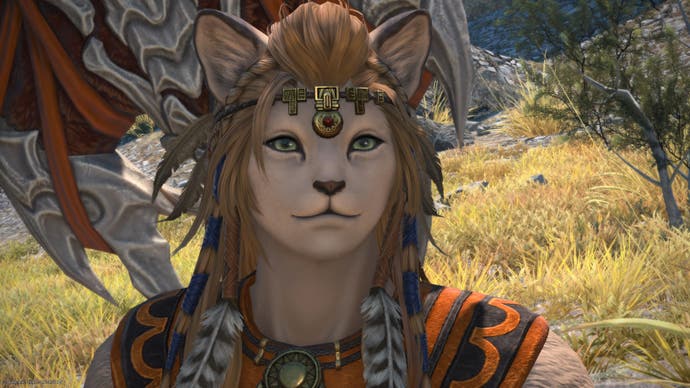
How do you feel your compositions have evolved over the course of Final Fantasy 14’s expansions? Was there anything in Dawntrail in particular that you were able to achieve that you hadn’t before?
I used to compose all alone, but for Dawntrail, this time around my younger subordinates were able to grow to the point that their powers were being shown. So I think that it’s a great example of their work.
Are there any Final Fantasy scores that have proven particularly inspirational for you?
There are way too many! I mean, all of the random encounter songs, aren’t they all good? And all the last boss songs, aren’t they all great? And the field songs are really good as well…they’re all good!
When you’re composing for Final Fantasy 14, do you feel the need to include older melodic themes as part of the game being a Final Fantasy theme park? Dawntrail, for instance, takes a lot of inspiration from Final Fantasy 9.
Of course, the aim of Final Fantasy 14 as a concept is to have a theme park of Final Fantasy. So I do think it is indeed important to pay homage to the past, but this isn’t something that I’m necessarily forcing to happen. That’s because the game content itself aims to pay homage to past titles, so we have plans to bring in past songs from before, and we also have plans to bring in certain elements from past songs into the music now. We never have a structure where we have the songs and the music before the [gameplay or story] content. When we decide to pay homage to a certain title and we decide to create an arrangement of a certain song, we do have to look back at what it was like back then [in context]. I do find myself sometimes taking phrases from a song in a way that makes past Final Fantasy players smirk, because I was a player of Final Fantasy as well.
What is the piece of music you’re most proud of?
That I’m proud of, I’m not too sure when you say it like that, but is it okay if I say a song that I like? So there’s a song called Away from Final Fantasy 16 and sometimes I listen back to it, and I think ‘this is a cool song’.
This interview has been edited for clarity.
